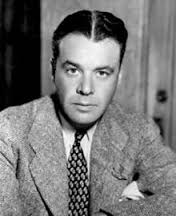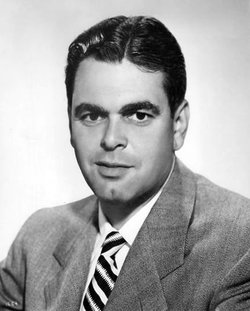
Today is the birthday of Irving Thalberg (1899-1936), a name well known to hardcore movie buffs as a visionary producer and studio chief; even better known to comedy buffs for his pivotal role in the career of the Marx Brothers (of which more below). Today seemed a fitting time for our long-planned post on the Marx Brothers’ producers in Hollywood…

Walter Wanger (The Cocoanuts and Animal Crackers)
Wanger was in charge of Paramount’s Astoria facility when the team went there to make their first two films in 1929 and 1930. We hear about his relationship with the team chiefly in relation to several minor run-ins he had with Groucho. Wanger had a reputation as a high-brow who’d begun his days in the theatre, working with such artists as Nazimova and Harley Granville-Barker. While he was the one who sought to acquire these Broadway hits, there had to have been a certain amount of culture clash with these scrappy vaudevillians. As indeed there apparently was when Wanger asked Groucho to use a more realistic looking mustache, and to cease his patented “direct address” since he would be talking to a camera rather than a live audience. Groucho’s response was to call him a “schlemiel” to his face.

Herman Mankiewicz: (Monkey Business, Horse Feathers, Duck Soup)
H’m…I think the three titles listed above say it all, don’t you? It seems to me that Mank was the team’s most sympatico producer (even if the boys themselves revered Thalberg as their favorite). The three made-in-Hollywood Paramount pix tend to be the hardcore fans’ favorite Marx Brothers movies. He also produced the equally zany Million Dollar Legs (1932) starring W.C. Fields and wrote the story for Meet the Baron (1933). Along with his brother Joe, he is majorly responsible for that glorious stretch in the early 30s of zany, nonsensical, surreal comedies. He only produced a handful of films. His greatest fame was as a screenwriter. Along with co-writer Orson Welles, he won a best Screenplay Oscar for Citizen Kane.
Irving Thalberg (A Night at the Opera, A Day at the Races)
The name Thalberg looms large in the Marx Brothers’ legend, as he is the man responsible for the near perfection that is A Night at the Opera and oversaw the beginning of A Day at the Races (which is flawed but their biggest money maker) and generally oversaw a reinvention of the team’s formula and screen image when they started at MGM. He is often decried for this by die-hard fans, but the fact remains that the decline of the Marx Brothers happened after Thalberg died. The one picture he cooked entirely from soup to nuts A Night at the Opera is imbued with his patented Hollywood magic….and since most of his pictures had that quality, there’s no reason to suspect the subsequent ones wouldn’t have had it too. What he might have done to improve A Day at the Races had he not died midway through production is academic, rather like “Would John F. Kennedy have taken us into Vietnam?”
Because of his magic touch at the box office, Thalberg was regarded as a kind of God at MGM and treated as such. The Marx Brothers were perhaps the only people he ever allowed to talk back to him (or possibly who dared). Moreover, they pranked him: roasting potatoes in his office on one occasion, and stripping off their clothes on another.

Pandro S. Berman (Room Service)
Room Service was the team’s least characteristic film and their only one for RKO. Berman was a producer with a long string of hits to his credit. At this stage, among his titles, the Fred and Ginger pictures seem the most relevant. He also produced Wheeler and Woolsey. So he knew how to do comedy, but Room Service was neither a critical nor box office success.

At the Circus has risen in my estimation in recent years; I now no longer think of it at the bottom but in the middle (the bottom of the middle). How’s that for hierarchy? And it certainly has first class production values, which you can’t say of their last two films at MGM. The fact that Mervyn Leroy produced my favorite movie The Wizard of Oz one year later, and so many other movies I love, makes me believe that the team would have been in good hands had he remained their producer. But it is much to his credit that he made The Wizard of Oz and Waterloo Bridge rather than Go West and The Big Store.

Jack Cummings (Go West)
Some factors that may help explain the abortion that is Go West: 1) Jack Cummings was Louis B. Mayer’s nephew (Mayer disliked the Marx Bros. He found them disrespectful; 2) Go West was one of Cummings’ first features; 3) Prior to this he had directed several Three Stooges shorts. Now, he later produced several Red Skelton movies for MGM that some people consider comedy classics, but I think we can agree that SOPHISTICATION in comedy was not his bailiwick. But the Three Stooges credits explain much about how the Marxes are presented in Go West. It would have been a much better film starring the Stooges, because at least they BELONG in a film of this nature and undoubtedly would have known just how to make it funny as they did in their many western themed shorts.

Louis K. Sidney (The Big Store)
A pretty certain sign that MGM wanted to get rid of the Marx Brothers just as much as the team wanted to quit is that they gave the reins to The Big Store to Louis K. Sidney. The Big Store was his second and last film. In fact I couldn’t even find a picture of him online. The picture above is his better known brother, the actor George Sidney. His son, also named George Sidney became a major director at MGM.

David L. Loew (A Night in Casablanca)
Okay, I have no photo for this chap either, although his name appears in really tiny letters at the bottom of this poster. By contrast with the last guy however, this gentleman was quite important. The son of one of MGM founders Marcus Loew, and a board member himself of the Loew chain, he became an independent producer and produced several classic Joe E. Brown comedies. And we have him to thank for coaxing the Marxes out of retirement to make this rather enjoyable late Marxian romp. Three chairs for that, I say!

Lester Cowan (Love Happy)
Lester Cowan is one of the more reviled names in Marxiania chiefly because: 1) most fans think Love Happy is the Marx Brothers’ worst movie (I don’t agree); 2) Groucho and Chico are shoe-horned into what was meant to be a Harpo solo vehicle in the crudest, lamest way possible; 3) and the climax of the film is marred by a surreal amount of product placement, turning the end of the film into a veritable commercial. Harpo was said to have been so mad at Cowan that he cursed and made nasty remarks — things the famously angelic Harpo rarely did.
Yet the film got made. Ya know how hard it is to make a film, starring 60 year old men whose thing is to leer at 25 year old women? Ask Bob Hope! But I can’t help noting Cowan had also produced the W.C. Fields classics You Can’t Cheat an Honest Man and My Little Chickadee. Interestingly, Love Happy was also the last film executive produced by Mary Pickford, studio chief of United Artists (and the last of the original four to remain at the studio).

Irwin Allen (The Story of Mankind)
Yes, that’s right, the famous “Master of Disaster” best known for The Poseidon Adventure and The Towering Inferno was the Hollywood producer who put the Marx Brothers on the big screen in the same film for the last time — although not together. This all-star picture is suitably weird and I am delighted to watch it any time it’s on.
**********

Of course the precipitating factor in this post is the current revival of the Marx Brothers I’ll Say She Is now at the Connelly Theatre through early June.
The current production has been particularly educational to me about the satisfactions of being a producer. In the 2014 production I was in full on producer/ director mode. In the current version I am taking a much smaller role, though still helping out in various ways. Re-directed, re-choreographed, re-realized from the minds of Diamond-Sisk, sitting in the audience I was still able to take a happy pride in the things that remained that were “mine”. Many of these things are “producer things”, e.g. hiring decisions: Seth Shelden (Harpo), Melody Jane (Beauty), C.L. Weatherstone (Simpson), and Amber Bloom (chorus) were my hires from the original production, as were musical director Sabrina Chap, technical director Tom Bibla, and costume designer Julz Kroboth. New people I brought into the current production include stage manager Sarah Lahue, and ASM Ken Simon. And, while the great Kathy Biehl was one of “Noah’s people” in the original production, I certainly approved her. So when people ask, as some have, “What do you do on this show?” one clear answer is that I brought together key members of the company — a happy thought.
And also I helped shape the show into its current form. All the principle artist Noah Diamond had to work with in building this massive entertainment were fragments, some large, some small. I helped make some key determinations about the running order: placing the Napoleon scene at the end of the second act, the poker scene in the transition between two scenes at the mansion, and the opium den and the trial at the climax. I also contributed a very small number of lines, and bits of business that are still in. And of course, as a producer, I raised a little money for the show…
Of course you can read all about it in Noah Diamond’s excellent book Gimme a Thrill. And better yet see the show, tickets and info are here.
For still more on the Marx Brothers, please read my own The Marx Brothers Miscellany: A Subjective Appreciation of the World’s Greatest Comedy Team — and come see us at Marxfest, May 17-26, 2024!

